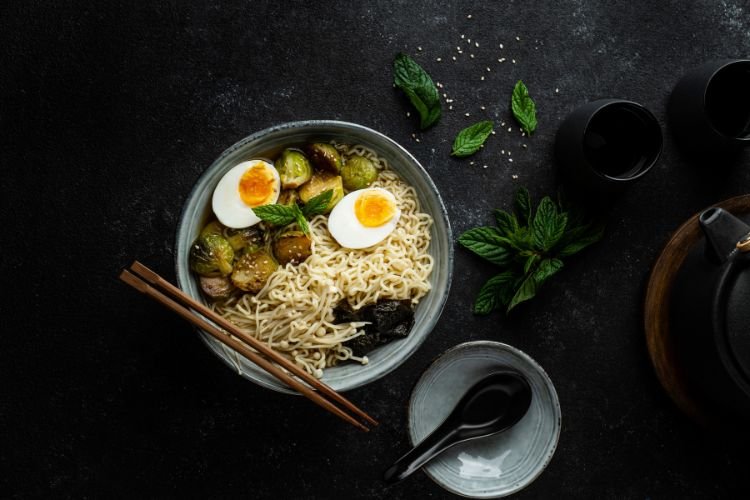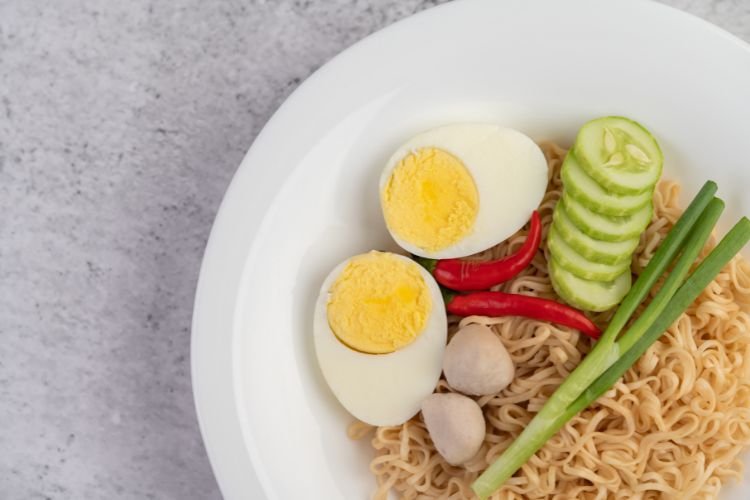The significance of an egg for ramen when eating ramen is undeniable, as it provides an additional layer of flavor that elevates every single bowl of ramen. As a ramen lover or someone who is eager to make the best out of their instant noodles, knowing how to prepare the egg that is best suited for ramen makes a huge difference in the tastebud experience like no other. In these steps, we will talk about how to prepare an egg for ramen, how to time a boiled egg to get the correct texture, and the process of marinating the boiled egg for consumption with ramen noodles.

Why the Egg for Ramen Matters
Ajitama or Ajitsuke tamago is the term used for an egg prepared for ramen, and it can be called the replica of a royal crown when it comes to ramen. An ideal ramen depends on the combination of white parts of the egg that are dry and cooked properly with the yolk that remains soft, runny, and custard-like, which serves as a compliment to the rich ramen soup. Similar to drenching a black tea boiled egg in sauce, when the egg is marinated, the egg has a lot of flavors, creating a bond to the ramen.
How To Boil An Egg For Ramen
The way of improving any egg dish lies in the egg boiling process; the demonstration cut is an ideal example in this context. Knowing how much time an egg should be boiled is the most important skill to acquire in order to produce an ideal egg with a jam-like yolk in the center.

Ingredients:
– 6 large eggs (the main ingredient for the egg for ramen)
– Water (for boiling the egg)
– Ice water (for cooling the egg for ramen after boiling)
Instructions:
Step 1:
Boiling the eggs:
Before moving on to the next step, let’s first prepare the boiling water. It’s best to use a pot filled with water. Allow it to come to a rapid boil. Using a spoon, gently lower the eggs into the water. This is helpful in preventing the eggs from breaking, therefore maintaining the quality of the egg, which is essential for ramen.
Step 2:
Boiling the Egg for Ramen:
Proceeding to boil the egg for ramen requires precision timing. Once the eggs are in the water, the timer should be set for 6-7 minutes. A soft, runny yolk is perfect for a soft-boiled egg. If you prefer a cooked yolk but still soft, go around 7 minutes but no more since it would be better to have a soft yolk than an overcooked one.
Step 3:
Cooling the Egg:
Soak the boiled portion in cold water immediately after the timer goes off. This is useful to halt the cooking process and also makes it easier to peel the egg for ramen.
Step 4:
Peeling the Egg:
Wait 10 minutes for the cooked egg to cool off completely in the cold water bath. Out of water, the cold egg and lightly begin taking off the shell of the konsa kabuto eggs.
How to Prepare a Marinated Boiled Egg for Ramen
Boiling an egg to use for ramen is one thing, but marinating the egg is also a different process. Boiling an egg to be used in ramen is one thing, and marinating an egg to be used in ramen is a different process altogether. To enhance the flavors in ramen, marinating the boiled egg for ramen is very useful since it makes the white and the yolk of the egg more delicious, adding light hints of the taste to the mouth while biting the egg.

Required Ingredients for Marinating:
– ½ cup soy sauce (to add umami to your boiled egg for ramen)
– ¼ cup mirin (to give it sweetness)
– 1 tablespoon sugar (to ease the saltiness)
– 1 cup water (or as much water as needed to cover the eggs completely)
Procedure of Marinating Eggs for Ramen:

Make the Marinade: Firstly, soy sauce, mirin, sugar, and water should all be combined in a bowl and then mixed together until the sugar is dissolved.
Marinate the Egg for Ramen: Now, this is the part when you place the boiled and peeled eggs in the marinade. The boiled eggs for ramen should be dipped entirely in order that all the flavors can be absorbed. C. In any case, 4 hours is the minimum time for effective marination, and staking marinated eggs for ramen overnight is better.
Caution When Serving: This is how to prepare the ramen how the ramen is supposed to be consumed, starting from serving the hot steaming bowl of ramen with the boiled eggs cut into two pieces, which are garnished on top.
Why You Should Freeze Eggs For Ramen Soup
The taste and texture of a yolk that has been marinated for ramen noodles completes the meal. The creaminess of the egg’s yellow filling is a nice compliment to the chewy ramen and the thick soup. A boiled egg for ramen is also positioned as a brilliant flavor; it makes instant ramen noodles taste like restaurant dishes.
Tips for the Perfect Egg for Ramen

Image by freepik
Cooking Time Matters:
When preparing the egg for ramen, always time how long you boil the egg. A few seconds too long can lead to a set yolk, which is not suitable for the perfect egg for ramen.
Marinating Time:
Even though one wants to shorten the marinating period, the boiled salted egg for ramen actually has more taste the longer it remains (up to a maximum of 24 hours).
Storage: If you have more prepared boiled salted eggs for ramen, keep them in the marinade and refrigerate for not more than 3 days. They can be used as great toppings for ramen noodles or salads.
Conclusion:
Egg for Ramen noodles and its Boiling Techniques
If homemade, what is the best possible ramen noodles that one can make? Specifically, how to boil an egg for ramen? Whether we want a runny egg yolk with a custard-like core or a fully cooked internal egg with no overpowering flavors, the best egg for ramen noodles compliments the rest of the dish with smooth mouthfeel and pleasing taste sensations. Now that you know of the boiling process and marinating and preparing a boiled egg for ramen, anybody who tries your ramen will be left speechless.





